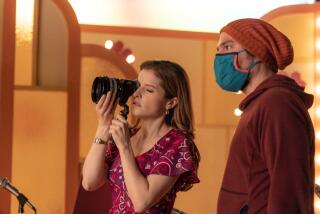African expat filmmaker Rosine Mbakam reveals the strength of women through cinema
- Share via
A deftly observed, two-part exhumation of trauma partially soothed by communal resilience, Rosine Mbakam’s nonfiction diptych, “The Two Faces of a Bamiléké Woman” and “Chez Jolie Coiffure” (screening as a double feature), lauds the feminine unity of Cameroonian women — both at home and abroad — while confronting the patriarchal subjugation and economic oppression that burdens them.
In the vividly poetic “Two Faces,” the director uses her homecoming to the village of Tonga and the capital city of Yaoundé after years in Belgium as a personal narrative engine. Now married (to a white man) and a parent herself, she interviews her mother, Mâ Brêh, an illiterate woman who makes a living selling fish at the local market, about the unspoken secrets women in her lineage guard.
Out of the darkness emerges a previously unrevealed frustration. Lyrical voice-over narration explains that Mbakam knew only the outward facet of womanhood in her country, the one that doesn’t ruminate on the soul-crushing effects of forced marriages or the perils of polygamy.
Throughout, Mâ Brêh’s weary and sorrowful face fills the screen with a dignified fortitude that’s been fined-tuned with each battle survived. Photographs of her youth evoke a distant past, when a different iteration of her was in charge.
In “Chez Jolie Coiffure,” headstrong Sabine, the hairdresser at the heart of the film, shares that hard-won practical sagacity, though she conceals it with buoyancy — she too hides her most downhearted face. Conceived entirely within a salon in Brussels’ Matongé district, a safe meeting point for immigrants, this sharp portrait of a self-assured asylum seeker attests to Mbakam’s dynamic storytelling with skillful framing in a tight space.
In between braiding hair or applying extensions, Sabine vents about her harrowing stint as a housekeeper in Lebanon, the white visitors who look at her and her clients through the window with an ethnographic gaze, and her fear of getting a fateful phone call from Cameroon announcing the death of a loved one. An expat herself, Mbakam understands such a dismaying prospect, and she says so in “Two Faces.”
Both part of a tontine, for financial and moral support, Mâ Brêh and Sabine believe in the might derived from fellowship, even more so as part of unprotected communities. Both films champion African women uplifting one another to walk out of the valley of suffering that their circumstances have dragged them into. Amplifying their valuable accounts, which are inherently tied to her own, Mbakam responsibly serves as protector of this collective bond and shared history.
Like all great documentarians, Mbakam synthesizes objectivity and idiosyncrasy during the process of extracting meaning from what occurs in front of her or the conversations she engages in. The camera acts as a direct extension of her eyes. She’d seen these women before but not through the revelatory lens of cinema, and what she discovered about them and herself is maybe more truthful than what reality alone can discern.
‘The Two Faces of a Bamiléké Woman’ and ‘Chez Jolie Coiffure’
In Bamiléké and French with English subtitles
Not rated
Running time: 1 hour, 16 minutes and 1 hour, 11 minutes
Playing: Starts Dec. 13, Lumiere Music Hall, Beverly Hills
More to Read
Only good movies
Get the Indie Focus newsletter, Mark Olsen's weekly guide to the world of cinema.
You may occasionally receive promotional content from the Los Angeles Times.










